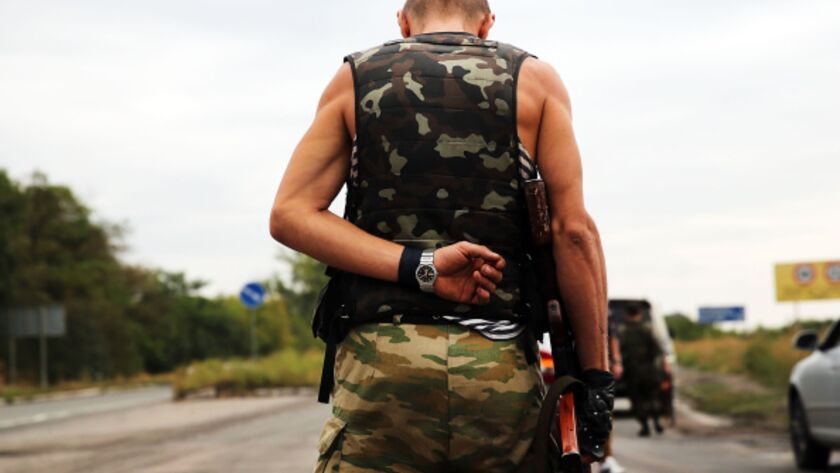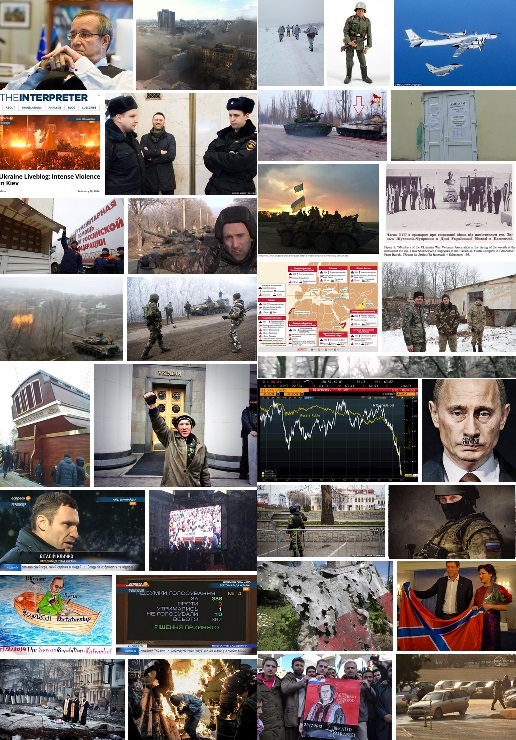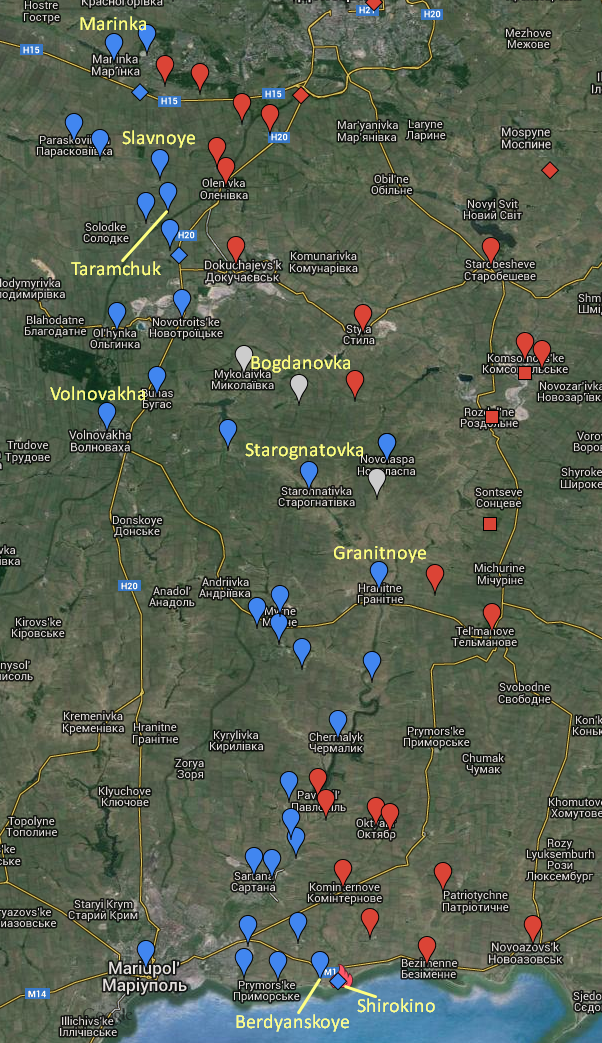Yesterday’s live coverage of the Ukraine conflict can be found here. An archive of our liveblogs can be found here. For an overview and analysis of this developing story see our latest podcast.
Please help The Interpreter to continue providing this valuable information service by making a donation towards our costs.
For links to individual updates click on the timestamps.
For the latest summary of evidence surrounding the shooting down of flight MH17 see our separate article: Evidence Review: Who Shot Down MH17?
The speaker of the Russian State Duma, or lower parliament, Sergei Y. Naryshkin, has been blocked by EU sanctions from traveling to the upcoming OSCE meeting in Finland. As a result, Russia has decided to boycott the meeting. The New York Times reports:
The Russian delegation was to have included Sergei Y. Naryshkin, the speaker of Russia’s lower house of Parliament, but Finland ruled that Mr. Naryshkin and five other Russians could not participate because of the travel bans the European Union imposed after Russia’s intervention in Ukraine.
Finland was not in a position to grant an exception to the European Union ban for members of the Russian delegation, Ilkka Kanerva, the Finnish president of the O.S.C.E. Parliamentary Assembly, wrote in a letter to the group on Wednesday.
A variety of issues are to be discussed at the upcoming session, including the Ukraine crisis. RFE/RL reports:
Naryshkin himself had submitted a document for discussion titled: “The inadmissibility of the use of sanctions against parliamentarians of the OSCE participating states.”
The lack of Russia’s presence, however, is not likely to significantly impact Russia’s relation to the OSCE, nor the Minsk peace process, in any substantial manner since attendance is optional and it is Finland, not the OSCE, which is blocking Naryshkin’s presence.
— James Miller
Translation: All the forces of the VSN [Novorossiya Armed Forces] have been withdrawn from Shirokino. The village has been occupied by the Ukes.
A page on the Russian social media website Vkontakte (VK) which is linked to Strelkov reports (translated by The Interpreter):
From “Novorossiya Militia Dispatches” group on VKontakte:
02.07.15 Report from war correspondent with the call sign “John Connor.”
“The DRN infantry is also withdrawn fro Shirokino and at the present time has occupied a position in front of Sakhanka according to the latest information.”
Report from Eduard Basurin
“DNR intelligence has discovered a convoy of 60 units of armor from the Ukrainian Armed Forces. In the Mariupol direction in Mikhailovka firing positions have been recorded of MRLS BM21 Grads; in the area of Paraskoviyevka the location of four units have been discovered of MRSL BM21s and a dozen self-propelled artillery units (SAUs), and in Yelizavetovka up to 60 units of tanks have arrived along with MRSL BM21 Grads and SAUs. Furthermore, the arrival of 8 units of MRLS has been observed in Konstantinovka to the west of Donetsk, and in Krasnogorovka the location of firing positions has been established of 4 SAUS.”
Interfax is also reporting this:
Translation: The fighters have left Shirokino and have concentrated to the east of the village
It’s not clear, though, if this is a withdrawal or a reshuffling of the forces on the front lines.
Here is a report from Komsomolskaya‘s war correspondent Dmitry Steshin, who says that the news will rile many separatist supporters who are now recruiting east of Shirokino, in Novoazovsk:
Translation: the post about Shirokino has raised a new wave of
volunteer fighters on Twitter. Sign-up is through personal notices, the
assembly will be at Novoazovsk on Monday at the Lenin statue.
Sakhanka is visible here on the map:
Translation: “They’ll get Sakhanka”
The OSCE is also being mocked for its role in creating a demilitarized zone here, since the Russian-backed fighters are already being accused of simply redeploying:
Translation: Tomorrow OSCE observers will observe the fact of demilitarization of Shirokino.
Meanwhile, the Azov Battalion, a group of Ukrainian volunteers, have posted a video which reportedly shows the “terrorists” shelling their own positions in Shirokino, potentially before the withdrawal. Many of the shells appear to fall on the homes of the town’s residents, however.
The document, obtained by us, is a consensus product of the Security Service of Ukraine and dated June 16. It identifies five Russian generals and a Russian colonel as playing a senior leadership role inside Ukraine. The Kremlin has repeatedly denied that Russian military personnel are directing military operations inside the country. Top Ukrainian intelligence officials shared the document with White House, State Department and U.S. intelligence officials in Washington late last month.
U.S. officials have confirmed receiving the document and told us that the information it contains generally conforms to U.S. intelligence assessments of Russian activity inside Ukraine. For more than a year, U.S. and NATO officials have accused Russia’s special operations forces and its military intelligence agency of aiding separatists in Ukraine.
The Ukrainian intelligence document goes further than previous public information by accusing specific Russian generals of being involved. These include Major General Oleg Mussovich Tsekov, who it says commands two brigades of the Luhansk People’s Militia, and Major General Valerii Nikolaevich Solodchuk, accused of commanding the first army corps of the separatist Novorossia armed forces in Donetsk. Other officers named include Major General Sergey Yurievich Kuzovlev, who it says commands regular Russian military operations in the Luhansk region and Major General Aleksei Vladimirovich Zavizion, who commands and coordinates Russian military operations in the Donetsk region. The dossier identifies Major General Roman Aleksandrovich Shadrin as the minister of state security for the Luhansk People’s Republic. It also says Colonel Anatolii Konstantinovich Barankevich, a former minister of defense for the Georgian breakaway republic of South Ossetia, serves as an adviser for combat readiness for the Luhansk People’s Republic.
Read the entire article here:

Ukraine Says Russian Generals Lead Separatists
Five Russian generals are playing a key role in organizing and commanding separatist forces inside Ukraine, according to a dossier provided by Ukraine's security service to the Obama administration last month. The document, obtained by us, is a consensus product of the Security Service of Ukraine and dated June 16.
Today is the 500th consecutive day of our Ukraine coverage. We have learned a lot in this time about not only what is happening in Ukraine and Russia, but about how we go about learning what is happening, and how we can try to predict what will happen next.
Read our special analysis here:

What 500 Days Of The Ukraine Crisis Have Taught Us
Today is the 500th day of The Interpreter's live coverage of Ukraine (read that coverage here). While the day is not an anniversary in the traditional sense, it is a milestone which marks two events – the day the Ukrainian police tried to storm Maidan Square to try to end the Euromaidan Revolution, and this […]
Despite yesterday’s announcement by the self-declared Donetsk People’s Republic (DNR) that Shirokino, a village east of Mariupol which has been the scene of intense combat since February, would become a “demilitarised zone,” Ukrainian sources report that attacks on their positions in the village have continued apace.
Yesterday, Denis Pushilin, representative for the DNR at the Minsk peace talks, told the pro-separatist Donetsk News Agency (DAN) that “as an act of good will and a demonstration of their peaceful intentions,” the DNR had “taken the decision to unilaterally declare Shirokino a demilitarised zone.”
However the Ukrainian Azov regiment reported yesterday that fighting was still under way with heavy fire from artillery and rockets.
Video uploaded yesterday shows shells striking the village and even the Ukrainian position from which the video was filmed:
Today DAN reports that the deputy commander of the armed forces of the DNR, Eduard Basurin, has claimed that all DNR forces have been withdrawn from Shirokino.
A post on the Azov regiment Facebook page this morning stated that fighting had continued throughout the night.
In addition to the shelling, there were shoot-outs in the village itself, Azov claimed.
While the battle was now over, the regiment reported that, in addition to Shirokino, Berdyanskoye, just to the west along the coast), as well as Bogdanovka and Starognatovka, to the north, near Granitnoye, had been attacked with tanks, 122 mm self-propelled artillery and mortars.
As we have been reporting, the area around Granitnoye has seen an elevated level of fighting and an extensive build-up of Russian-backed forces in recent weeks.
In turn the ATO Press Centre reported further attacks on Ukrainian positions on the Donetsk-Mariupol highway, west of Starognatovka.
According to the report, the villages of Taramchuk and Slavnoye were shelled with 122 mm howitzers last night.

The Press Centre reported in more detail on the attacks on Starognatovka and Shirokino (translation by UNIAN):
“In the direction of Mariupol, the Russian mercenaries fired tank shells and mortars on the village of Starognatovka. In addition, around midnight the militants fired 122mm and 152mm artillery systems on the outskirts of the village of Berdyanskoye. At the same time, breaking their promises of demilitarization, the fighters of the self-proclaimed Donetsk and Lugansk People’s Republic militant organizations continued to attack the village of Shirokino,” the press centre said.
“After midnight, the militants have already attacked Ukrainian army positions 10 times. The Ukrainian military give an adequate and effective response, using allowed weapons,” the press center said.
The ATO Press Centre also reported attacks on Peski, Marinka and Pervomayskoye, all on the western outskirts of separatist-held Donetsk.
In the Lugansk region, the report says, Novotoshkovskoye, Stanitsa Luganskaya, Krymskoye and Zolotoye were attacked with mortars, anti-tank weapons, small arms and RPGs.
— Pierre Vaux
Aleksandr Zakharchenko, the leader of the self-proclaimed “Donetsk People’s Republic” (DNR) has declared a “special self-governance regimen” in the DNR and announced elections for October 18 of this year, the pro-separatist rusvesna.su reported.
Zakharchenko issued a statement to news agencies saying the DNR had to react to the “unilateral actions of Kiev regarding passage of amendments to the constitution.”
Yesterday July 1, President Petro Poroshenko said Ukraine would follow the so-called “Law on the Special Status of Donbass” that provides for self-governance in “certain districts” of Donetsk and Lugansk Regions, but would not make any amendments to the constitution — calling such notions “diabolical.”
Zakharchenko stated (translation by The Interpreter):
Under the current circumstances, the Donetsk People’s Republic has been forced for the sake of saving the Minsk accords to independently go forward to implement them. The DNR will act immediately without waiting for Kiev to come to its senses.
First, the DNR declares that a special self-governance regimen is in effect on its territory, several conditions of which are mentioned in the law of Ukraine “On the Special Status of Donbass,” in point 11 of the Complex of Measures [the Minsk Accords] and also the draft amendments to the constitution of Ukraine proposed by us. Secondly, in fulfillment of point 12 of the Complex of Measures, local elections will take place in the DNR with observance of the relevant OSCE standards with monitoring by the Office for Democratic Institutions and Human Rights (ODIHR) and other international organizations. The procedure for monitoring and the work of the observers are ready to be approved within the Contact Group.
Zakharchenko claimed that “Ukrainian representatives took part in the discussion and approval of all the above-mentioned decisions.”
Zakharchenko’s interpretation of the Minsk 2 accords are sure to provoke controversy. The accords state as follows (point 11):
Constitutional reform in Ukraine, with a new constitution to come into effect by the end of 2015, the key element of which is decentralisation (taking into account peculiarities of particular districts of Donetsk and Luhansk oblasts, agreed with representatives of these districts), and also approval of permanent legislation on the special status of particular districts of Donetsk and Luhansk regions in accordance with the measures spelled out in the attached footnote,[note 1] by the end of 2015.
The language of the agreement is sufficiently vague that Ukrainian leaders may say they already passed the law on the special status, and “decentralization” and “constitutional reform” can be understood in different ways by the parties to the conflict. These issues were left to be negotiated later after the February cease-fire — which no longer holds — was in place. But Poroshenko’s administration does not negotiate currently directly with the “People’s Republics”; past president Leonid Kuchma is the Ukrainian representative at the Minsk talks.
Poroshenko has noted that elections would have to take place under Ukrainian law, as the Minsk accords state, and would have to involve freedom of the media, freedom for any party to registery and so on. Yet the DNR has essentially banned parties that don’t support its authoritarian rule and has suppressed the media except for those support its rule and the Russian government.
The Minsk accords also specify that Ukraine must be handed back control over its border, which has been seized in the southeast of Ukraine by Russian and separatist forces who show no sign of returning it.
— Catherine A. Fitzpatrick
A bomb went off early this morning at a cafe in Odessa. No injuries were reported.
The cafe, owned by Irina Angelina, was apparently once visited by Mikhail Saakashvili, former president of Georgia and now mayor of Odessa.
Translation: an explosion thundered at the entrance of a cafe in Odessa.
TV 112 reported that police made a statement (translated by The Interpreter):
On 2 July at 02:50 (local time) a report was received that on 38 Zhukovskogo Street at the restaurant Angelovs’ there was an explosion.
The doors and facade of the building were damaged, and the explosion sent broken glass into the apartments over the restaurant and nearby.
— Catherine A. Fitzpatrick